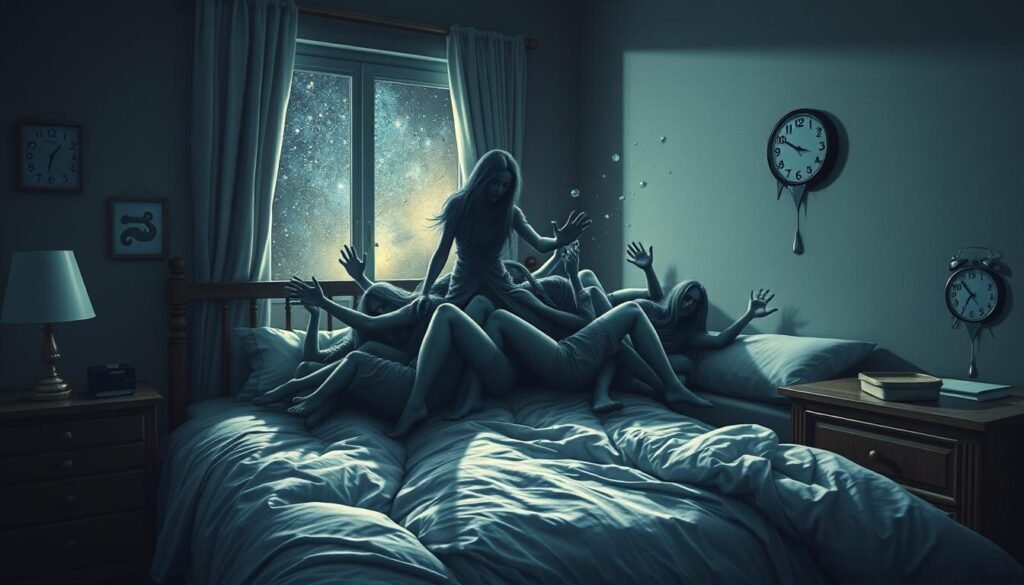Around 3.9% of adults have reported experiencing frequent nightmares in the last month. This significant number highlights how common sleep issues are. Insomnia, affecting about one-third of U.S. adults, may play a role in this. The way insomnia and nightmares are linked is complex but key to understanding sleep health. Our goal is to look into whether insomnia can lead to nightmares and affect dreams.
It’s vital to grasp how insomnia impacts sleep quality, not only for personal health but for overall well-being too. By delving into the effects of insomnia and its link to nightmares, this guide offers insights and tips to better manage sleep health.
Key Takeaways
- Insomnia affects about one-third of adults in the U.S.
- 3.9% of adults experience frequent nightmares.
- There’s a big link between insomnia and mental health issues, like depression.
- Good management techniques can help improve sleep and lessen nightmares.
- Women are more prone than men to have frequent nightmares.
Understanding Insomnia and Its Effects
Insomnia affects many people around us. It’s important to understand it to manage it better. It comes with symptoms that make daily life hard. Knowing about insomnia, its signs, and its effects can push people to get help.
Definition of Insomnia
What is insomnia? It’s when you can’t sleep well, either falling asleep or staying asleep. This results in poor sleep and distress. Being intermittent or chronic, insomnia complicates life in various ways.
Common Symptoms of Insomnia
Insomnia leads to several symptoms that affect how we function every day. These symptoms include:
- Fatigue during the day
- Irritability and mood swings
- Difficulties with concentration
- Memory issues
These issues come from lack of sleep and the emotional stress of insomnia.
Long-Term Effects on Sleep Health
Insomnia doesn’t just affect your mood and energy. Over time, it can lead to serious health problems. These include:
- Increased risk of mental health disorders
- Weakened immune system
- Higher likelihood of chronic conditions like obesity and diabetes
| Insomnia Symptoms | Potential Long-Term Effects |
|---|---|
| Fatigue | Mental health disorders |
| Irritability | Weakened immune system |
| Difficulties concentrating | Chronic health conditions |
| Memory issues | Decreased quality of life |
What Are Nightmares? A Brief Overview
Nightmares are much more than bad dreams. They are vivid and can make you wake up feeling scared or anxious. Unlike bad dreams, they really shake you up. The term nightmares definition matches their strong emotional impact.
Defining Nightmares vs. Bad Dreams
Nightmares have a key feature: they can wake you up. They bring a lot of distress too. On the other hand, bad dreams are not as intense. They rarely wake you up. This difference matters a lot when looking at how nightmares affect sleep.
The Role of REM Sleep in Nightmares
REM sleep brings the most vivid dreams, including nightmares. When this sleep stage is disrupted, nightmares can happen. This makes good sleep hard for some. Knowing how REM sleep plays into this is key to understanding sleep health.
Frequency and Demographics of Nightmares
Nightmares vary a lot among different groups of people. About 4% of adults have a nightmare disorder. For children, it’s around 1%. However, 2% to 6% might have nightmare disorders. Women tend to have nightmares more often than men.
Kids under ten see the highest rates of nightmares. Between 50% to 85% of adults will have nightmares now and then. This shows how common sleep problems can be.
Can Insomnia Cause Nightmares?
Lack of sleep affects not just how well we sleep, but also our dreams. Studies show that people who don’t get enough sleep have more nightmares. This can start a cycle of bad dreams that ruins good sleep.
How Sleep Deprivation Influences Dream Content
Insomnia and nightmares are closely linked. Those with insomnia may notice:
- More scary or stressful dreams.
- Trouble getting back to sleep after a nightmare.
- Waking up a lot, which messes with deep sleep.
This leads us to wonder: does insomnia cause nightmares? Yes, research shows that not sleeping well can make nightmares more likely.
Case Studies Connecting Insomnia and Nightmares
Studies have looked at how insomnia is related to bad dreams. One study found:
| Type of Experience | Percentage |
|---|---|
| Patients reporting insomnia | 45.9% |
| Patients experiencing nightmares (at least monthly) | 15% |
| Patients with frequent nightmares (at least weekly) | 3.6% |
| Patients with anxiety symptoms | 16.9% |
| Patients suffering from depression symptoms | 18.5% |
This information shows a clear connection between not sleeping well and having nightmares. People who have nightmares often are more likely to feel anxious or depressed. This goes to show how bad sleep can trap you in a cycle of scary dreams.

The Relationship Between Insomnia and Sleep Disorders
Insomnia often goes hand in hand with various sleep disorders. This affects a person’s sleep quality and health deeply. It’s important to understand how they connect to treat them right. Sleep apnea and restless leg syndrome are a few disorders linked to insomnia. They can make symptoms and problems worse.
Types of Sleep Disorders Related to Insomnia
Many sleep disorders mix with insomnia. Here are some common ones:
- Obstructive Sleep Apnea (OSA)
- Restless Leg Syndrome (RLS)
- Periodic Limb Movement Disorder (PLMD)
- REM Sleep Behavior Disorder (RBD)
- Narcolepsy
People with insomnia may have other sleep disorders too. Research shows that 50 million Americans battle chronic sleep issues. It’s crucial to tackle these problems together.
Understanding Secondary Insomnia
Secondary insomnia comes from other health or mind issues. It can be caused by:
- Nightmares or night terrors
- Chronic pain or discomfort
- Medications and their side effects
- Mental health problems like anxiety or depression
Finding the cause of secondary insomnia is key for helping. By dealing with these causes, people can sleep better and ease insomnia. Knowing how insomnia and other conditions are linked is important. It helps people manage better and find the right help, as UpToDate shows.

| Type of Sleep Disorder | Symptoms | Link to Insomnia |
|---|---|---|
| Obstructive Sleep Apnea | Interrupted breathing, loud snoring, excessive daytime sleepiness | Often leads to poor sleep continuity and insomnia |
| Restless Leg Syndrome | Urge to move legs, discomfort at rest, improved with movement | Can disrupt sleep onset and maintenance |
| Narcolepsy | Excessive daytime sleepiness, cataplexy, hallucinations | May manifest as insomnia due to fragmented sleep patterns |
Understanding the roots of secondary insomnia helps people. It leads to better sleep and health.
Anxiety, Stress, and Their Connection to Nightmares
Anxiety is key to how well we sleep and our mental health. It’s clear that anxiety and nightmares are linked when we look at anxiety dreams and insomnia. Many people with anxiety have nightmares often. These are usually because of ongoing high stress. This disrupts sleep and can make things worse, reducing sleep quality.
How Anxiety Dreams Interact with Insomnia
Studies show a worrying trend in older adults with Generalized Anxiety Disorder (GAD). They have more bad dreams than others. Their daytime anxiety symptoms often mean more nightmares too. Using techniques like thinking of positive mental images can help. Actions such as progressive muscle relaxation and meditation can decrease anxiety. This improves sleep and mental health overall.
The Impact of Stress on Sleep Quality
Stress greatly changes how well we sleep. It makes it hard to fall asleep or stay asleep. Those dealing with a lot of stress often have anxiety and nightmares too. This shows how crucial managing stress is. A study found that even a little exercise improves sleep and lowers stress effects. Good stress management means better sleep and a calmer mind for rest.

| Factor | Impact on Nightmares | Impact on Sleep Quality |
|---|---|---|
| Anxiety Disorders | Increased frequency of bad dreams | Disrupted sleep cycles |
| Stress Levels | Heightened anxiety dreams | Difficulty in falling asleep |
| Sleep Hygiene | Reduces occurrences of nightmares | Improves overall sleep health |
| Exercise | Potentially decreases anxiety | Enhances sleep quality |
| Meditation Techniques | Can diminish anxiety dreams | Promotes relaxation and better sleep |
Effects of Insomnia on Overall Mental Health
Insomnia often affects mental health deeply. People dealing with it might struggle with mental issues like depression and anxiety. It shows why treating insomnia early is crucial for better mental health in the long run.
The Connection Between Insomnia and Depression
Research shows that insomnia and depression often go hand in hand. With more than 90% of depressed individuals having sleep problems, the connection is clear. Insomnia can make depression worse, leading into a hard cycle to escape from. This cycle makes it even more important not to ignore these issues.
Potential Risks of Untreated Insomnia and Nightmares
Not dealing with insomnia can lead to increased anxiety and less sharp thinking as time goes on. Nightmares can prevent the deep, healing sleep needed, making mental health issues worse. For those with PTSD, insomnia and nightmares are common, affecting 50-70% of sufferers. This can badly upset sleep and harm mental health.
Improving Sleep Quality and Managing Nightmares
Nightmares can really mess with your sleep and even lead to insomnia. To tackle nightmares, it’s key to try different strategies that make sleeping better. Focusing on sleep hygiene, therapy, and certain sleep behaviors is crucial for this.
Sleep Hygiene Tips for Better Sleep Health
Good sleep hygiene is vital for better sleep. Important habits include:
- Sticking to a regular sleep schedule by sleeping and waking up at the same times daily.
- Having a calm bedtime routine, maybe with some reading or light stretches.
- Staying away from screens an hour before bed to reduce stimulation.
- Keeping your sleep space cool and dark.
Also, learning how to handle nightmares could help. You can find ways that directly deal with bad dreams here.
Therapeutic Approaches to Addressing Nightmares
There are therapies that really help with nightmare-related anxiety. Cognitive-behavioral therapy (CBT) is a big one. It breaks the cycle of bad sleep experiences. Techniques in mindfulness and relaxation also lower stress.
If you need more specific help, there are medicines that can better your sleep. Always talk to a doctor for the best advice on treatments.
Behavioral Techniques for Managing Anxiety Dreams
Behavioral ways to manage sleep can cut down on nightmares. Using methods like muscle relaxing or deep breaths is helpful. These help you relax before sleeping. They move your mind and body from anxious thoughts to a calmer state.
Combining sleep hygiene, the right therapy, and behavioral methods helps a lot. These steps not only fight insomnia but also boost your mental health.
Research Findings on Insomnia and Nightmares
Recent studies show a strong link between insomnia and more nightmares. People with insomnia often have more of these bad dreams. Knowing this is key to better sleep and mental health.
Recent Studies Linking Insomnia and Frequent Nightmares
A lot of studies have found a connection between insomnia and nightmares. One study found that 18.3 percent of those with insomnia often have nightmares. These nightmares happen during REM sleep, which is vital for our health.
Stress and anxiety, common in people with insomnia, increase these bad dreams. In one study with college students, 47 percent had nightmares in just two weeks. This shows how common it is among young adults.
Statistics on Insomnia and Sleep Deprivation
Sleep deprivation is becoming more common, and insomnia plays a big part. It makes it hard to sleep and leads to fatigue and more stress. This can make dreams worse.
Between 20 to 39 percent of kids aged five to twelve have nightmares. This hints at early sleep issues that could run in families. Though nightmare disorder is rare, it can cause daytime sleepiness and mood problems.
Conclusion
A clear link exists between not sleeping well and having bad dreams. This link shows why good sleep habits are crucial for our health. Many young people often have nightmares which disrupt their sleep and day-to-day life. It’s important to understand how sleep troubles and nightmares affect each other.
By focusing on better sleep habits and keeping an eye on our mental health, we can improve our sleep. If sleep problems and nightmares persist, it’s wise to seek help from a professional. This approach can lead to better sleep overall, as pointed out in our discussion on sleep health.
Understanding the role of sleep issues in mental well-being helps us find specific solutions. For those dealing with sleep problems, it’s essential to take steps to improve your sleep. Knowing about helpful resources can make a big difference in tackling these challenges.